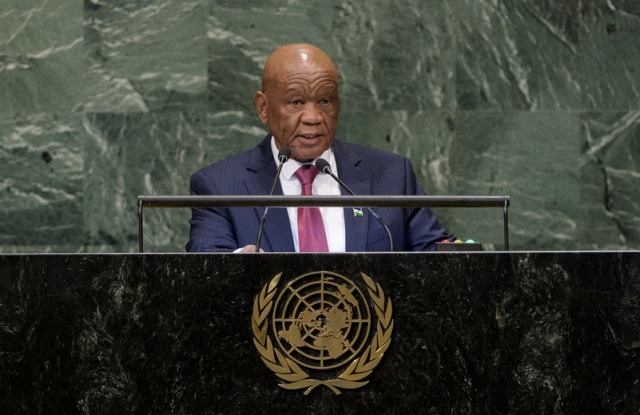 Thomas Thabane at the United Nations. [photo[UN General Assembly]
Thomas Thabane at the United Nations. [photo[UN General Assembly]
The small state, encircled by South Africa, has been the scene of an extraordinary drama as Lesotho’s prime minister, Thomas Thabane, failed to appear in court to face murder charges and police hunted for his wife, who had fled to South Africa.
Thabane is accused of acting ‘in common purpose’ in the murder of his second wife, Lipolelo Thabane, in June 2017. An arrest warrant had been issued for his third wife, Maesaiah Thabane, after she failed to appear for questioning in January and disappeared for two weeks. Maesaiah, whom Thabane married two months after the killing, eventually surrendered to police and was charged with Lipolelo’s murder and the attempted murder of a family friend, Thato Sibolla, who was with Lipolelo and is expected to be a key witness. Maesaiah did not enter a plea and was released on 1,000 loti (£50) bail. Police said eight other suspects would also be charged.
Thabane’s son Potlako said his father had not appeared as he had been seeking medical treatment. Appearing in court days later, the prime minister’s lawyer claimed Thabane, 80, should not be charged as his position granted him immunity. Police must now wait until the high court rules on the constitutional issue.
Lipolelo Thabane, 58, was shot dead at close range by unknown attackers beside a dirt road near her home in Ha ‘Masana, a village near the capital, two days before her estranged husband’s inauguration for a second term. Though they had lived apart since 2012, they were not divorced and she had recently won a high court case confirming her privileges as first lady.
Thabane’s spokesman, Thabo Thakalekoala, said: ‘The prime minister is protected by the constitution, although he is not above the law. This whole exercise is just meant to embarrass him.’ However, phone records allegedly link Thabane to the murder scene, according to court documents filed by Lesotho’s police commissioner, Holomo Molibeli. A letter from Molibeli to Thabane last December, seen by AFP news agency, read: ‘Investigations reveal that there was a telephonic communication at the scene of the crime … with another cell phone. The cell phone number belongs to you.’
Even before she was charged with murder, Maesaiah Thabane – born Liabiloe Ramoholi – was a controversial figure after several alleged assaults. Her charity trust fund was allegedly defrauded. There was fierce criticism of her even from Thabane’s own party, the All Basotho Convention (ABC), which heads a fragile ruling coalition. In July 2019 its deputy leader, Nqosa Mahao, accused her of carrying out a ‘bedroom coup’ and directing the sacking and appointment of ministers and senior civil servants. He likened her to the late Zimbabwean president Robert Mugabe’s young wife, Grace. ‘It doesn’t matter what the leader may want: if his wife says it shouldn’t happen, it will surely not happen,’ the Lesotho Times reported Mahao as saying. ‘She is singularly the most powerful person in the country.’
The comments followed a power struggle between figures in the ABC close to Mahao and Thabane’s supporters that ended up in the high court, after each faction ‘suspended’ or ‘expelled’ opponents. The ABC’s split mirrored wider instability in Lesotho. The last elections in 2017 were the third in three years, after the previous seven-party coalition, led by Pakalitha Mosisili’s Democratic Congress, collapsed. Thabane won only 48 of 80 seats, needing three smaller parties’ support for a working majority. The Lesotho Defence Forces are another source of tension, after they stormed buildings in 2014 in what they claimed was an attempt to curb the power of the police as a rival armed force. Thabane, who fled to South Africa, claimed it was an attempted coup. A year later, Lt Gen Maaparankoe Mahao, briefly made LDF commander before the ‘coup’, was murdered by soldiers. Frustration at an apparent cover-up over the killing prompted his brother Nqosa to enter politics.
After Thabane was charged over his wife’s murder, the ABC called him a ‘threat to the nation’. Announcing that he would step down as PM in July, he did not mention the case. ‘At my age,’ he said, ‘I have lost most of my energy.’ An early general election now seems inevitable. Mahao, whom Thabane reportedly called a ‘useless rag’ last year, looks poised to benefit. The popular former vice-chancellor of Lesotho’s National University has the support of Thabane’s son-in-law, Lebohang Hlaele, who was sacked as law minister for backing Mahao. But if he does take office, says Prof Roger Southall, of Wits University, ‘it will be at the head of an extraordinarily fragile coalition … with the related risk of further involvement by the military in the political arena.’



